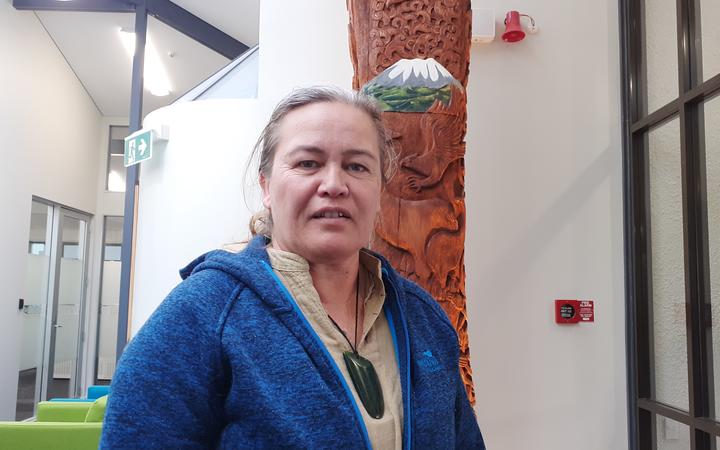Māori advocates will march against Ruapehu District Council in Taumarunui in protest at what they describe as the minimising of Māori representation, participation and “an undertone” of institutional racism.

Māori wards advocate Fiona Kahukura Chase Photo: LDR / Moana Ellis
Māori ward advocate Fiona Kahukura Chase said Māori have been fully engaged with Ruapehu District Council for two years to try to achieve equitable representation arrangements, but claims Māori continue to be marginalised.
The council is consulting with the community on its proposal for how many councillors it will have and who they will represent, including the number of councillors to be elected in the 2022 elections from its first Māori ward.
“Ruapehu District Council keep on making decisions that minimise Māori representation, so we’re calling it for what it is. There’s an undertone or it might be an overtone of institutional racism,” Chase said.
“We want to be heard. Māori have been telling them over and over again that we want more than the small offerings they have put out in their representation proposal, which is for two Māori seats.
“We’re going to insist they work harder and make better decisions for Māori and for the community as a whole.”
The council is proposing cutting the number of councillors from 10 to eight plus the mayor, with two of the councillors from a Māori ward.
In consultation hui, Māori asked for the number of Māori seats to be closer to half of council, with a minimum of three, to reflect the 45.3 percent of the Ruapehu District population that is Māori.
A hīkoi through the Taumarunui main street from Mōrero Marae to the council chambers has been called for 20 October, where submissions on the council’s initial representation proposal will be heard.
The council did not respond to Chase’s assertion there was institutional racism within the council.
Ruapehu Mayor Don Cameron said the number of Māori seats is set by legislation as a proportion of the total number of councillors.
He said the proposal for two Māori seats as opposed to three is open for consultation.
“The consultation on the Representation Review closes Friday 8 October, so there is plenty of time for people to put in a formal submission on this matter,” Cameron said.
“I would urge people to put in a submission on their views and support that with a presentation to council during the hearing process.”
Councillor Janelle Hinch told Local Democracy Reporting the council clearly supports Māori wards otherwise it would not have voted to introduce them. She said she firmly believes there should be representation from all sectors of the community and specifically mana whenua, and the current proposal was a step in the right direction.
However, people should be able to ask questions without being labelled, and it was important to continue to have upfront conversations about Māori representation.
Hinch acknowledged Chase’s concerns about institutional racism but said this was a systemic issue.
“There is in general a barrier to Māori representation – that goes back a long way. But I think it’s unfair to blame the incumbent councillors for the proportion of people on council currently who are Māori,” Hinch said.
She said nobody ran for council from the Māori community in the Taumarunui ward in the last elections.
“How do we get mana whenua to run for a seat?”
Councillor Adie Doyle said he supports Māori seats but wants a smaller, more focused council of eight in which Māori would have two seats by right. For three seats, more Māori would need to be enrolled on the Māori roll, councillor Doyle said.
“We went through a huge number of permutations and combinations with regards to numbers. We decided that a smaller council of eight would be better from a decision-making perspective. The number of Māori seats was two, based on the numbers.
“We are talking about a rounding up or a rounding down – with a council of eight, Māori would have 2.34 seats. With a council of nine, Māori would have 2.64 seats and you would have to round that up. But you would need to get more people on the Māori roll.”
Doyle said he had no problem with the balance changing in the future.
“I have no problem with five general and three Māori, but that has to be by the numbers – the number of people on the Māori roll.
“Eight is the important number – a smaller, more focused group of elected representatives.
“The councillor’s role is to set the direction of council. I don’t think we’ve done this for the last two years. At the moment, I feel the council is too large and management is running things, not council.”
Doyle said he voted for Māori wards because under the Local Government Act there was provision to promote and enhance Māori representation in the decision-making process.
He said the council’s proposal included an increased number of community board members, which would increase the total number of elected representatives.
“As we talk through this process, the over-arching vision is that a group of elected representatives works best if working together for a common cause – the improvement of the lives of all of the ratepayers.”

Local Democracy Reporting is a public interest news service supported by RNZ, the News Publishers’ Association and NZ On Air.